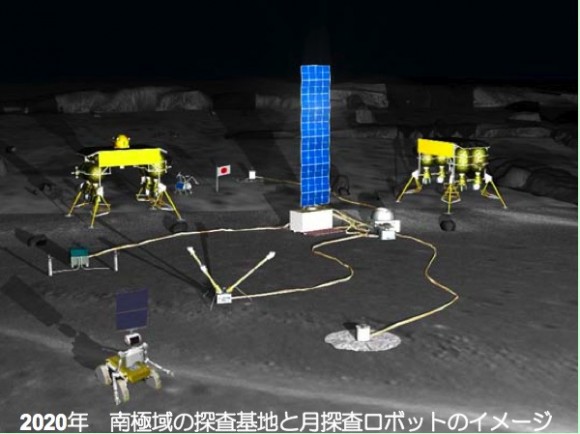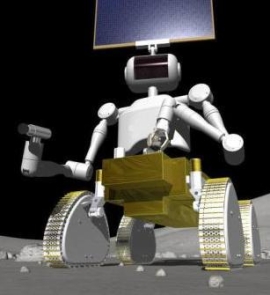A panel appointed by the Japanese Prime Minister prepared preliminary plans for the robots to begin building a base near the south pole of the moon. The robotic base will be powered by solar power. The cost of the project - about 2.2 billion dollars
By: Nancy Atkinson; Translation: Avi Blizovsky

The Japanese space agency, JAXA plans to build a base on the moon by 2020. It is not a manned base but one that is also built for robots. A panel appointed by the Prime Minister of Japan prepared preliminary plans for landing humanoid robots and robotic vehicles on the moon in 2015. These robots will then begin building a base near the moon's south pole. The robotic base will be powered by solar power, with a total cost of about 2.2 billion dollars, says the chairman of the panel and president of Waseda University, Katsuhiko Shirai.
Some of these androids will weigh about 300 kg and move on chains similar to tank chains. According to the report, they will be able to operate within a radius of 100 kilometers from the base. They will be equipped with solar panels, seismographs for studying the interior of the moon, high-resolution cameras, and arms that can collect rock samples, which will be sent to Earth in a rocket designed for this purpose.
The exact location of the base will be chosen with the help of the images launched by the Japanese lunar probe Kagoya, which took spectacular pictures of the lunar surface.

Earlier, the Japanese space agency announced that it plans to establish a manned base on the moon starting in 2030 and eventually, the robotic base will be a sort of precursor to this base. The plan calls for astronauts to visit the moon starting in 2020, similar to that of the Indian Space Research Organization (ISRO), which also hopes to launch a manned mission to the moon. The China National Space Agency (CNSA) has said that they too want to send humans to the moon by 2030.
And what will NASA do about it? The Constellation plan to return to the moon has been canceled, but it won't be canceled without a fight from members of Congress and others, but even if NASA decides to launch the next manned mission to an asteroid or Mars, they will have to use the moon for training.
It is better that we all work together so that the return to the moon will actually come true.

7 תגובות
Very Good! Competition in space!
The previous space race also resulted in technological breakthroughs and it's great that there are now many female players. Space belongs to everyone and it must not fall into the hands of this or that country or any organization of this or that.
These rumors are unfounded.
Rumors also say that within two generations a huge population of robots will replace all of Japan's human inhabitants.
Japan does not exterminate canes at all. Here is a piece of news that appeared here on the website only a week ago:
The Open University, Monday, May 24, 2010
Prof. Yoav Yair from the Department of Natural and Life Sciences at the Open University was invited to participate as a guest researcher in a study that will review the atmosphere of the neighboring planet - Venus
Japan is the third most economically powerful country (as reflected in the GDP of 5 trillion dollars per year) after the USA (15 trillion dollars per year) and China (6). This is of course as a single country. If you count all European countries together, they are in second place with 15 trillion, and Japan is therefore only fourth, but they are able to spend the money if they want ($2 billion) in one year without blinking.
There is a fundamental difference between Japan and China and India, although they are also closing the gap (which exists anyway in terms of GDP per capita, because they are much more populated).
A cost of 2.2 billion dollars is not too high for Japan, it may even accelerate growth in Japan.
In my opinion, it is worthwhile for Israel to join such a project that does not include the USA and involves knowledge-rich technologies in the field of robotics (a field in which Israel is strong).
Are all the statements of Japan, China and India just talk, because such an operation is several steps bigger than them, or is the USA left behind?